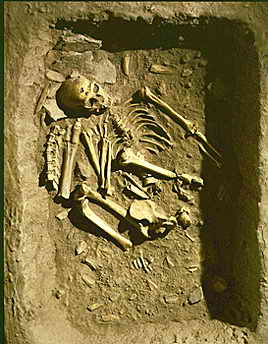Uraug lived for twelve years following
his injury. He was carried in a litter made of hides with supporting
wooden poles, remarkably similar to a modern stretcher. He moved with
the camp and was provided for by the members of his tribe. Always adept
with his hands, Uraug now refined his skills and eventually became a
master craftsman of the Mousterian tool tradition. Finally, his contemplative and
retrospective nature led him to become the shaman and seer for the tribe.
shaman and seer for the tribe.
Although initially despondent following
his injury, Uraug did develop a reason to keep going. It seems that
shortly after his accident, he was given a wolf pup to care for, and the
two became inseparable friends.
Over the years Uraug's legs became
profoundly atrophic, as evidenced by decreased bone mass and diminished
muscle attachment sites, all of which were observed when his skeleton
was excavated in 1974. A large area of bone erosion, with multiple
layers of reparative bone were found in his sacrum. The healed and
displaced 9th thoracic vertebra fracture did not go unnoticed.
Pollen analysis of the soil excavated
from his grave revealed large amounts of alpine flower pollen suggesting
blossoms had been placed over the body at the time interment. The pollen
analysis suggested his death occurred in late spring. Several hand axes and spear
points of exceptional quality were also present. As his bones were carefully removed, the
excavators were perplexed to find a second, intact, skeleton in the grave. It was
that of an aged wolf with worn teeth and advanced arthritic changes of
the hips and limb bones.
The next case is that of a common
problem, namely treating a person with cancer. |